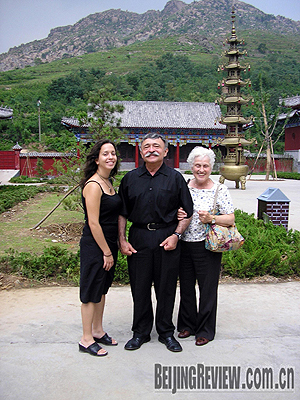|
|
 BACK AGAIN: Guy Salvatore Alitto pays a return visit to Zouping after 22 years with his daughter and wife in June 2007 (COURTESY OF GUY SALVATORE ALITTO)
BACK AGAIN: Guy Salvatore Alitto pays a return visit to Zouping after 22 years with his daughter and wife in June 2007 (COURTESY OF GUY SALVATORE ALITTO) |
Guy Salvatore Alitto, a history professor at the University of Chicago, can still recall his first visit to Zouping County in east China's Shandong Province some 22 years ago.
"There was only one street which had some sidewalks. That was it," Alitto said as talking about his recollections of Zouping in 1986, when he visited the area as an expert with the Committee on Scholarly Communication with China under the U.S. National Academy of Sciences. "It had nothing that stayed open after 6 p.m. except for the cinema that was built a year before. Outside the cinema there was somebody selling peanuts. That was Zouping's nightlife."
A typical agricultural county and one of the more than 2,000 ordinary counties in China, Zouping was the first rural area opened to foreign scholars. Since his first visit there where he spent nearly a month interviewing local people for firsthand research, Alitto, whose Chinese name is Ai Kai and who speaks fluent Mandarin and publishes extensively in Chinese, has been back to the county every year, closely following its development.
"Every time I went, physically things were changing by the minute," Alitto said. During later visits to Zouping he saw shopping malls and stores open one by one, and the whole county started to look more like a city instead of a one-street country town.
The changes in material life have been remarkable in Zouping during the past two decades, Alitto said.
"People whom I visited just got better and better living quarters," he said.
After the household contract responsibility system was implemented in the early 1980s, farmers were allowed to start working for themselves. As soon as people got the opportunity to work for themselves, "they would work like crazy," Alitto said, based on what he had seen and heard from local residents.
During the past 22 years, Alitto has talked to hundreds of local residents, especially senior citizens. He said in 1986 local officials pre-arranged all his interviews, and when he returned the following year, he still did not find it easy to speak openly with people.
That changed in 1988, when local officials became more open and relaxed about the interviews, and local residents were more willing to and confident about talking to him, Alitto said. His most valuable interviews were with some old women sitting outside their front gates sewing shoes. He would sit down and chat with them without any tape recorder or notepad, he said. Such dialogues were "extremely valuable," much more so than the formal interviews he had recorded and transcribed, he said.
"Wealth brings freedom," Alitto said. He said that since 1988, it had gotten easier to talk to anyone he met on the street without permission from the local authorities. It also reflected the more subtle changes that were going on in people's mind, he added. He found that local people's awareness of the outside world changed enormously, primarily because, with economic development, television ownership became more prevalent. Alitto said that by 1988, many residents had their own TVs, which helped change their mentalities a lot.
When Alitto visited Zouping in 1988, he lived in Fengjia Village in the north of the county. He recalled that he had the largest TV, so locals came to his quarters to watch programs about hip-hop dancing. Alitto said he was so surprised that the awareness of international popular culture exceeded his own in such a small Chinese village. He recalled, "I said, 'What the hell is this?' They all looked at me strangely and said, 'What do you mean? It's hip-hop.'"
Another indication of local residents' awareness of the outside world came when Alitto visited Zouping again in 1991. He received an unexpected greeting from one of his old friends who said to him, "Congratulations on the Bull!" Alitto was so confused until he finally figured out that it was about the Chicago Bulls winning the National Basketball Association Championship that year.
"I myself didn't even pay attention to that," Alitto said.
Looking back over the last two decades, Alitto is amazed at how Zouping has developed."I don't dare say that this could be a model for all of China, but it's done extraordinary well," he said.
(Reporting from New York) | 